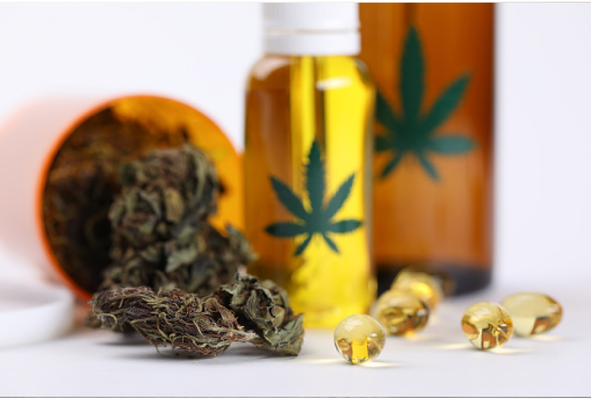
What You Need to Know About HHC Hexahydrocannabinol
How Is HHC ( Hexahydrocannabinol) Made?
Cannabis contains more than 80 different chemical compounds. One of the most well-known is THC (delta-9 tetrahydrocannabinol). While THC is the most important compound in cannabis, it actually only makes up about 60% of the plant. The remaining 40% of the plant is made up of another cannabinoid called CBD (cannabidiol).The production of HHC begins with the extraction of cannabidiol from raw hemp. CBD is extracted via distillation and isolation. The final product has a powdered texture and is frequently sold separately as CBD isolate. From there, a great deal is determined by the maker. Bearly Legal, for instance, describes its HHC production technique as a 'secret process' without disclosing much. THC is hydrogenated by exposing it to hydrogen, high pressure, and a metal catalyst such as palladium, platinum, or nickel. Once the catalyst has performed its function, it is removed from the mixture. A 2007 study described the capability of turning CBD into various types of HHC via gastric juice. However, there is almost little additional information about this method of producing HHC. Finally, there is some evidence that HHC can be synthesized from a terpene called citronellol. How firms generate HHC also raises questions about its legality.
Is HHC Legal?
Cannabis is legal in many states and countries. The laws on HHC vary from state to state, but there are currently no federal laws regulating HHC. So, if you live in a state where cannabis is legal, you are free to use it as a supplement or medicine. The federal government does not recognize any medical benefits of cannabis. Industrial hemp cultivation is currently permitted in the United States, as long as the delta-9-THC percentage does not exceed 0.3 percent. While hemp is best known for its high concentrations of CBD, it also contains a variety of other cannabinoids. Technically, goods containing other hemp cannabinoids remain legal if the THC content does not exceed 0.3 percent. The manufacturers of HHC goods are convinced that all is legal.
According to the FDA's Interim Final Rule (IFR), synthetic cannabinoids are prohibited in hemp, while naturally occurring cannabinoids are acceptable. However, reality is rather different. While HHC is not identical to THC, it may be prohibited if deemed synthetic. True, HHC naturally occurs in hemp and cannabis, albeit in trace amounts. HHC is manufactured in a laboratory using a chemical procedure designed to produce more of it. Then there's the minor matter of the Federal Analog Act, which prohibits the use of any analog of a Schedule I drug, such as delta-9-THC. As a result, regardless of what HHC dealers state, you consume items containing it at your own risk.
Is HHC Stronger Than Delta-9-THC?
The Delta-9-THC in cannabis is the main psychoactive ingredient. It is what makes people feel high. The Delta-9-THC in cannabis has been found to have a variety of medical benefits and it is most known for its ability to help people with glaucoma, many forms of cancer, and nausea. However, it does not affect everyone, so some people will not feel any effects from Delta-9-THC. For those who do not experience any effects from it, other cannabinoids can be used for different conditions. These include cannabidiol (CBD), cannabinol (CBN), tetrahydrocannabinol (THC), and cannabigerol (CBG). These are all referred to as cannabinoids because they are all chemical compounds that interact with the endocannabinoid system.
Due to a dearth of study, it is difficult to determine the precise potency of HHC. Indeed, even HHC product producers acknowledge a lack of consistency. The ratio of inactive to active HHC molecules varies between batches. While these corporations make every effort to maximize the concentration of active ingredients in a product, they do not have complete control. HHC appears to be more potent than delta-8 but not as potent as delta-9 based on its chemical structure. According to various estimates, hexahydrocannabinol is possibly up to 80% as intoxicating as D9. As a general rule, any THC form with four or more carbons on its side chain is psychoactive. For example, delta-8, delta-9, and delta-10 THC and HHC all contain five carbons. By the way, the most potent version of THC, THCP, contains seven carbons.
HHC Effects and Benefits
Due to a dearth of scientific proof, the HHC cannabinoid's purported advantages and effects are largely anecdotal. According to those who have used it, HHC produces similar effects to THC, including euphoria, changed auditory and visual perception, and cognitive alterations. In general, you can anticipate relaxing effects similar to those of delta-8-THC. However, some people report feeling more energised and having a clearer mind. In a 1977 investigation, HHC was tested on rats. The researchers discovered that while cannabinoids may share some qualities with narcotic medications, they also had substantial distinctions. The 2007 study previously stated examined HU211 and HU243 in mice. It was discovered that HHC increased sleeping time by between 80% and 700%. Additionally, the researchers stated that the cannabinoid exhibited characteristics similar to delta-9-THC in rats, although with less strong pharmacological effects. A 2011 study investigated LYR-7 and LYR-8, two HHC analogs. The study discovered that the chemicals may have the capacity to block tumor cell development and angiogenesis, a critical phase in the formation of malignancies. A 2010 study discovered that HHC's effects persisted a long time in rats. Apart from the limited study discussed in this section, there is no other evidence linking HHC to the stated benefits. Without a doubt, there are no human studies that provide any information. Apart from the possibility of pain relief, HHC may provide the following benefits:
- Euphoria
- Bodily intoxication and Cerebral
- Alleviation of nausea and vomiting
- Reduced inflammation
- Relief from anxiety
- Relaxation
- Improved sleep
A low THC tolerance should be taken into consideration if HHC is 80 percent as powerful as delta-9-THC. Start with no more than 3-5mg to see how it affects you physically and mentally.
Is HHC Safe?
Short- and medium-term harmful effects of HHC products are unknown because they are relatively new to the market. Nobody can say for certain. They claim that it's safe because it's made from a plant called hemp. However, the lack of research is still an issue. Even if no negative effects have been reported, it doesn't indicate it's risk-free. The following negative consequences are possible since delta-9 shares many properties with the psychoactive compound tetrahydrocannabinol (THC), including a comparable high.
- Red eyes
- Heightened anxiety and paranoia
- Dry mouth
- Increased appetite
- Dizziness
- Insomnia
- Elevated heart rate
Another issue is a lack of oversight. Even though there are many HHC-related businesses, only a few are well-known. Vape cartridges are the most common kind of HHC products. Vaping has been linked to lung disease, so it's important to be cautious while purchasing HHC goods. Keep your eyes out for lab findings from the few reliable companies that provide this cannabinoid. Later on, we'll discuss some of the best brands out there.
Does HHC Show up on a Drug Test?
This is yet another uncharted territory. If you take a 5-panel or 10-panel drug test, you'll likely find traces of HHC in the results. One theory is that HHC does not undergo 11-hydroxy-THC metabolism in the same way that delta-8 or 10 do. Drug testing can identify this metabolite. If HHC is undetectable in a drug test, it is certain to be a hugely popular item. Being able to have a drink or two without fear of being detected by a drug test is enticing. However, we must stress that there is no conclusive evidence either way. If you use HHC, you'll never know if a drug test detects it in your system or not.
Who Sells the Best HHC Products?
There are currently few recognized HHC vendors or relevant items. " THC-O and HHC-O are among the specialized cannabinoids that Bearly Legal is known for selling at a high level of quality. For the time being, it only sells HHC vape cartridges and sweets under that brand name. There is up to 99 percent THC in 1ml of HHC carts. Each of the company's gummies contains up to 20mg of the psychoactive compound HHC. As a first-time user, we recommend that you consume no more than half a Gummy. Delta Extrax (formerly Delta Effex) and Fuked Up are two other well-known names in the industry. But Binoid is widely regarded as one of the most reliable suppliers of HHC. A 1000mg HHC tincture and 1 gram marijuana vape cartridge are among the company's high-quality offerings. Cartridges come in a variety of flavors, including:
- Gorilla Glue
- Super Silver Haze
- Sunset Sherbert
Final Thoughts on the HHC Cannabinoid
It's important to remember that while HHC products may be novel and intriguing, scientific evidence supporting their efficacy and safety is lacking. Although it isn't conclusive, it's possible that HHC exhibits THC-like effects, including intoxication. After taking this cannabinoid, users report feeling peaceful, relaxed, and cheerful. A possible analgesic effect may be possible.
The gentler nature of delta-9-THC may be advantageous for those who find cannabis a little too potent for their liking.
In spite of this, HHC's long-term impacts are well documented. Currently, there is a great deal of ambiguity around its legality. Products containing less than 0.3 percent delta-9-THC could be lawful in the United States since they are made from industrial hemp. The truth is that although hemp and marijuana naturally contain HHC, it is synthesized in a laboratory, making it an illicit substance.
In general, if you have a medical marijuana card and live in a state where marijuana for adult use is legal, you can probably use it. Otherwise, its use could lead to legal repercussions.



.png)